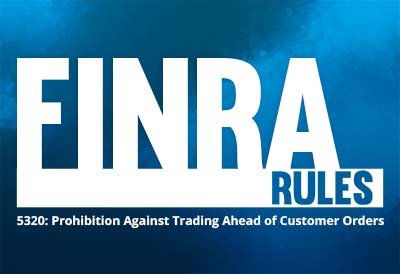 Brokers and brokerage firms each owe their clients a fiduciary duty. This means that they have a professional obligation to always put the best interests of their clients above their own financial interests.
Brokers and brokerage firms each owe their clients a fiduciary duty. This means that they have a professional obligation to always put the best interests of their clients above their own financial interests.
One common example of an industry practice that is a violation of fiduciary duties is ‘trading ahead of customer orders’. This unlawful practice seriously disadvantages customers. Under FINRA Rule 5320, trading ahead of customer orders is strictly prohibited.
Trading Ahead: The Basics
Imagine that an investment advisor’s customer put in a standing order to buy 1000 shares of ‘Stock X’ if the price were to fall below $25 per share. One afternoon, the price of this stock drops to $24.90, with several thousand shares available at that price. Then, the broker, believing that stock is undervalued, immediately buys 10,000 shares on his personal account, driving the stock price back up to $25.50. The customer’s standing order is never executed.
The above hypothetical is a simple example of a broker trading ahead of a customer order. The stock in question was available at a price that could have fulfilled the customer order, but instead, the broker took the option to purchase it for himself. This is a clear violation of FINRA Rule 5320. The rule has been violated regardless of what happens next. If a trade to fill the customer order is never made, then the customer loses out on an opportunity. If a trade is made, then the customer was forced to pay a higher price than they would have had the order been properly executed.
At this point, the broker or brokerage firm must immediately rectify the situation. This must be done by getting their customer the stock that they wanted for the same price (or a better price) than the firm got for itself. If the situation is not fixed, then the investor’s legal rights have been violated.
Trading Ahead Can Result in Tremendous Investor Losses
When brokers or broker-dealers trade ahead of orders, customers can incur serious losses. For example, in 2009, a major ‘trading ahead case’ was brought against E*Trade Capital Markets LLC. According to the complaint filed by the Securities and Exchange Commission (SEC), E*Trade Capital consistently traded ahead of customer orders, bringing in more than $28.3 million in ill-gotten gains for the firm. In this case, a small amount was taken from many different investors.
In other cases, broker-dealers trading ahead of customer orders end up taking a large amount from a small number of clients. For instance, John Thomas Financial, a New York-based brokerage firm, was expelled from the securities industry after FINRA investigators determined that it had violated Rule 5320, resulting in 14 of the firm’s customers to lose out on more than $1.1 million.
Rule 5320: The Exceptions
While Rule 5320 applies to most situations, there are few important exceptions that investors need to know. Specifically, the two key exceptions are:
Large Orders and Institutional Accounts
Institutional accounts, as defined by FINRA Rule 4512(C), along with large customer orders that are in excess of 10,000 shares and $100,000, are not automatically subject to Rule 5320. Instead, brokers and brokerage firms must simply disclose to these customers (large orders and institutional) whether or not they might trade ahead of their orders.
When such a disclosure is made, these customers then will have the legal right to ‘opt-in’ to rule 5320 coverage. If a customer affected by this exception does not opt-in, then, under FINRA regulations, they are ‘consenting’ to their broker trading ahead of their order.
No-Knowledge
Rule 5320 also includes a ‘no-knowledge’ exception. Under this exception, a brokerage firm will not be held liable for trades on its own account if it lacks the knowledge that such a trade would violate the rule. To be clear, this rule does not let firms plead ignorance to get around general enforcement. Instead, it only applies to firms where appropriate internal barriers have been erected to separate the different trading units. For example, many large brokerage firms separate their market-making trading desk from their principal trading desk.
Get Legal Help Now
If you sustained losses because a broker or brokerage firm trading ahead of your order, our team can help. We have a full understanding of FINRA Rule 5320, including prior case law. To request a free case evaluation, please contact us today at 844-689-5754.
CONTACT US FOR A FREE CONSULTATION
Se Habla Español
Contact our office today to discuss your case. You can reach us by phone at 844-689-5754 or via e-mail. To send us an e-mail, simply complete and submit the online form below.

